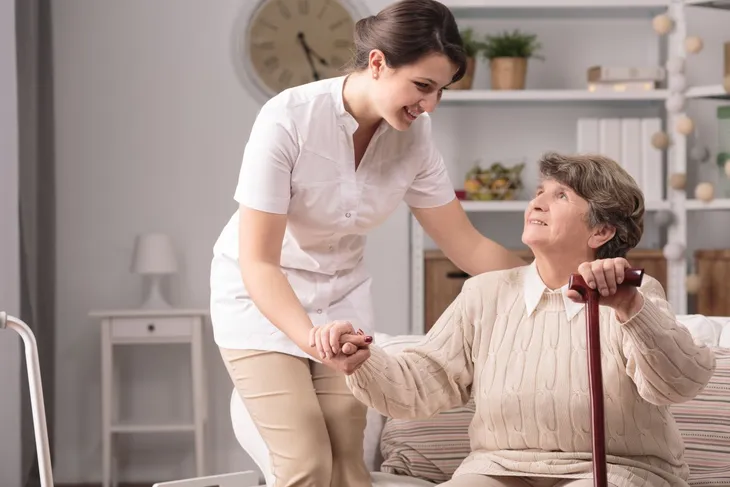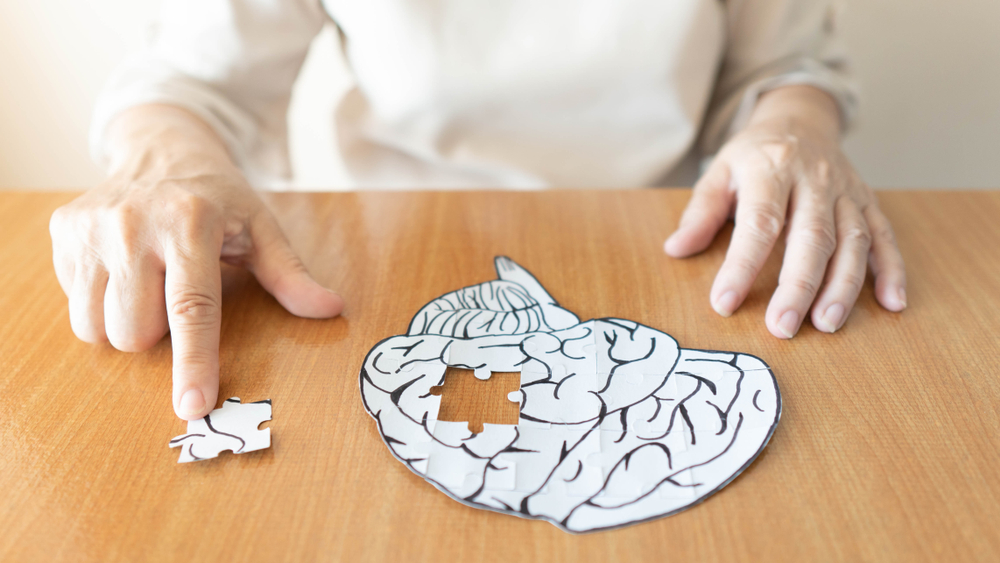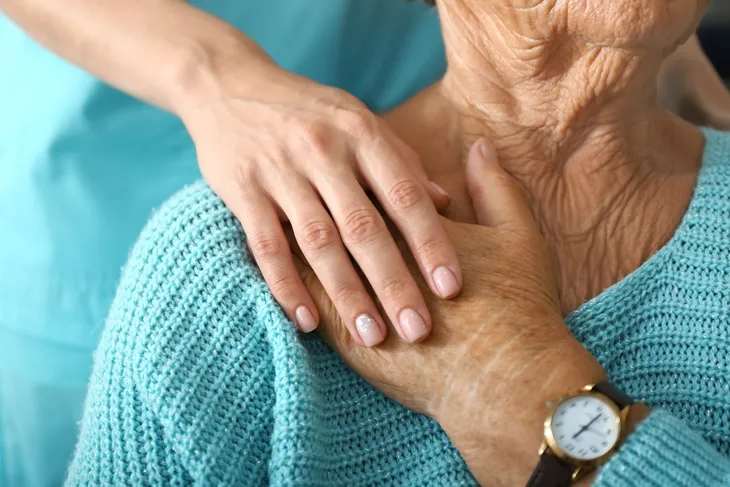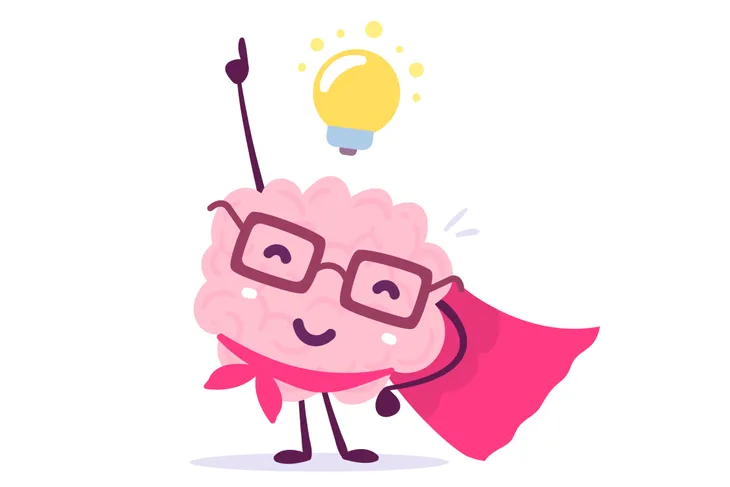- Dementia is a general term for mental decline.
- While a diagnosis can be devastating and terrifying, your medical team will help you learn what it means and your next steps.
- But can dementia be cured? Let’s find out.
A dementia diagnosis can be devastating and scary for both the individual and their friends and family. And it’s easy to see why. Dementia is a general term for mental decline that can cause an individual to lose their memory, and ability to think and reason. They may also lose control of their emotions, and sometimes even their personality changes.
After a dementia diagnosis, your first thought will likely be, what can we do to cure the disease? Many people wonder if someone can fully recover from dementia and live a normal, healthy life but it turns out, the answer is complicated. Let’s take a look at if a person can recover from dementia plus what you can do to reduce your risk.
Can a Person Recover From Dementia?
Unfortunately, there is currently no cure or treatment that can reverse the cognitive decline caused by dementia. So no, a person cannot fully recover from dementia. But that doesn’t mean all hope is lost.
The National Health Service points out that since dementia is caused by different diseases, it’s also very unlikely that there will ever be one single cure for dementia anyway. However, research is working hard at finding cures for dementia-causing diseases like Alzheimer’s disease, frontotemporal dementia, and dementia with Lewy bodies.
Additionally, there are strategies that can help an individual manage the symptoms caused by dementia to improve their quality of life for as long as possible. Let’s take a look at some of these strategies next.
 mentalmind / Shutterstock
mentalmind / ShutterstockWhat We Know About the First FDA-Approved Therapy
According to the Alzheimer’s Association, aducanumab is the very first medication for Alzheimer’s disease to receive approval from the U.S. Food and Drug Administration (FDA). While this medication is not a cure for Alzheimer’s, it aims to reduce clinical decline.
The source explains, “aducanumab reduces beta-amyloid plaques, which is reasonably likely to lead to a reduction in clinical decline due to Alzheimer’s disease.” This therapy may offer longer independence for individuals with Alzheimer’s and may help the individual hold onto memories for longer too. Talk to your doctor to find out if this is an option for you or your loved one.
Medications That Treat Symptoms of Dementia
Aducanumab is currently the only FDA-approved medication that may help change the disease progression, however, there are a variety of other medications available that aim to reduce some of the symptoms caused by dementia.
For example, Alzheimer’s can cause behavioral and psychological symptoms such as sleep disturbances, hallucinations, and delusions. Luckily, there are medications available that may help reduce these symptoms. Other medications aim to stabilize cognitive symptoms like a decline in memory and thinking. While there are a variety of medications available, your doctor will determine which ones are best for you or your loved one.
Treating Behavioral Changes Caused by Dementia
In the early stages, dementia can cause an array of behavioral changes from irritability to anxiety and depression. As the disease progresses, other symptoms may occur such as aggression, agitation, emotional distress, physical or verbal outburst, restlessness, hallucinations, delusions, and sleeping difficulties. These behavioral changes aren’t only distressing but they can be hard to live with too.
To treat these behavioral changes, the Alzheimer’s Association says that doctors will typically start with a medical evaluation to help identify if there are any underlying causes. While behavioral changes are often caused by dementia, there may be an underlying condition that can be treated such as a side effect of a medication or discomfort from another infection or condition.
The source notes triggering situations may also induce behavioral changes so identifying these and then avoiding them may also be an effective way to treat the symptoms.
How to Cope With Behavioral Changes
Another important step in managing behavioral changes is learning how to cope with them. Luckily, the Alzheimer’s Association provides a list of coping tips that can help your loved one feel more comfortable.
For starters, the source says to monitor their personal comfort, including checking for pain, hunger, thirst, constipation, full bladder, fatigue, and infections. You can also support them by creating a calm environment and maintaining a comfortable room temperature.
The Alzheimer’s Association also recommends avoiding confrontation or arguing about facts and don’t take their behavior personally. It’s also important to acknowledge their requests and provide plenty of rest between stimulating events.
Treating Sleep Changes
Dementia can often cause sleeping problems. For example, the individual may have difficulty sleeping, such as waking up often throughout the night. It’s also common for the individual to feel drowsy during the day, which may lead to more daytime naps.
If your loved one develops sleep disturbances the Alzheimer’s Association suggests starting with a full medical exam to find out if there are any underlying (and treatable) conditions that may be causing the problem. Some treatable conditions that can contribute to sleep disturbances include depression, restless leg syndrome, and sleep apnea.
After ruling out these conditions your doctor may recommend strategies to help improve their sleep routine and sleep environment. These may include maintaining a regular schedule for eating and sleeping, seeking more morning sunlight exposure, encouraging daily exercise, avoiding caffeine, and creating a comfortable sleep environment. The source says if these strategies fail then medication may be necessary.
Alternative Treatments
Some people are turning to alternative treatments to try and prevent or delay Alzheimer’s disease. However, it’s important to know that these treatments are largely based on anecdotal evidence and small research studies.
The Alzheimer’s Association lists Ginkgo Biloba, coral calcium, caprylic acid and coconut oil as a few of the alternative treatments. Some people have also looked into omega-3 fatty acids as a treatment option. You can learn more about these potential treatment options on the Alzheimer’s Association’s website.
Safety Precautions to Take With Alternative Treatments
The Alzheimer’s Association says that even though there is some anecdotal evidence and small studies that say alternative treatments may be helpful in treating symptoms of dementia, there are a few safety precautions you need to know.
For starters, there isn’t enough scientific research to confirm the effectiveness of these alternative treatments. The safety is also unknown. The source explains, “the rigorous scientific research required by the U.S. Food and Drug Administration (FDA) for the approval of a prescription drug is not required by law for the marketing of dietary supplements.” Additionally, the FDA has no authority over supplement production, which means it’s up to the manufacturer to ensure the product is safe. Finally, the source also notes that some supplements can have serious interactions with prescribed medications.
The best thing you can do is talk to your doctor about these alternative treatments to find out if they’re safe and worth trying.
Important Questions to Ask Your Doctor
Even though there is no cure for dementia, as we just discussed there are treatment strategies available that may help slow the progression or help the individual cope with the symptoms. The most important thing of all is to work closely with your medical team to create the best treatment for you or your loved one. Keep in mind treatment goals can change along the way too.
To ensure you know and understand all your options, the Alzheimer’s Association suggests creating a list of helpful questions to ask your doctor. For example, you should ask your doctor what treatment options are available as well as what side effects to expect. You should also find out how they will measure the effectiveness of each treatment.
All in all, the best treatment plan should be tailored to the individual based on their age, overall health, the severity of the symptoms, their living situation, and their current treatment goals.
Can Dementia Be Prevented?
If you have a loved one suffering from dementia and you’re worried about your risk, then you’re likely wondering if it can be prevented. According to the National Health Services, there is no surefire way to prevent all types of dementia. This is likely because researchers are still trying to figure out how it develops in the first place.
That said, the source says “there’s good evidence that a healthy lifestyle can help reduce your risk of developing dementia when you’re older.” In addition to reducing your risk of dementia, a healthy lifestyle can help reduce your risk for other serious health concerns like heart disease and stroke.
Know the Risk Factors of Dementia
One crucial step in reducing your risk for dementia is understanding what the risk factors are. Unfortunately, some risk factors are out of your control such as age and genetics, however, some are within your control.
According to the National Health Services, untreated depression, loneliness, social isolation, as well as sedentary lifestyles may increase your risk of dementia. These risk factors can be modified and the source says that research shows improving these risk factors can reduce your risk “by around a third.”
Healthy Lifestyle Tips
Certain lifestyle adjustments can support your heart and brain health which play a role in reducing your risk of dementia. For starters, the National Health Services says maintaining a healthy weight and eating a healthy, balanced diet are two important lifestyle tips that can reduce your risk.
Other lifestyle adjustments you should consider include reducing alcohol intake, quitting smoking, and maintaining healthy blood pressure levels. Exercise is also very important. The Centers for Disease Control and Prevention (CDC) says that adults need at least 150-minutes of moderate-intensity aerobic activity each week as well as 2-days of muscle-strengthening activity.
Finally, if you’re feeling isolated, anxious, or depressed, reach out for help from a professional. You should also talk to your doctor for additional tips to help reduce your risk of dementia.














